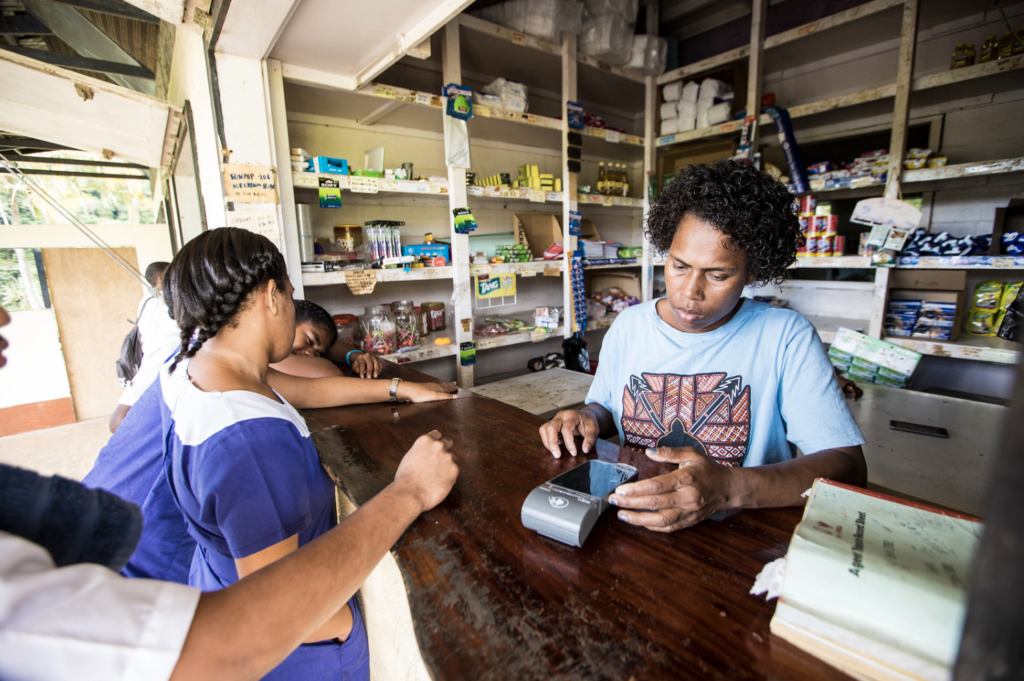Vodafone's Rural Agents are Unlocking Financial Services for Those Who Need It Most
Tags
Meet 56-year old Laisiasa Tolevu, a small canteen owner in Naimasimasi village, a 30-minute drive from Korovou Town in Fiji.
Lai is one of 75 mobile village agents deployed by Vodafone Fiji in 2018 to improve the adoption and usage of digital financial services in rural and remote locations in Fiji.
Lai’s role as an agent is to assist customers of Naimasimasi village and three other neighbouring settlements with their transactions. He teaches them to use their mobile phones for a variety of everyday digital financial services.
“My village has really benefitted from the new services that my canteen provides. People are able to top up their e-transport cards, pay for recharge cards, buy groceries, bank into their Westpac and HFC accounts, pay for hire-purchase accounts, electricity and receive money from their family members living abroad.
I have also noticed that my sales have been increasing each month as more and more villagers have started using M-PAiSA, Vodafone Fiji’s mobile money platform. Many of them realize that M-PAiSA makes their lives easier and simpler and they do not have to travel out of the village to complete their transactions,” said Lai.
Lai added that while some villagers do work in the nearby towns, they don’t always have the time to pay for their utility bills during normal working hours. He said that this is the major advantage of M-PAiSA. “When banks are closed in the weekends or afterhours, my customers can easily pay for their electricity or banking as my canteen stays open from 6am – 9pm daily.”
The largest cash withdrawal that Lai has facilitated was FJ$300 (USD 138) sent from a British army soldier to a family member in the village. To manage his liquidity (cash on hand), Lai advises his customers to give him at least two days’ notice if they are expecting large withdrawals so that he is able to assist them.
According to Vodafone’s agent network team, Lai is the strongest MVA they have recruited over the past year. from September to mid December 2019 alone, Lai had facilitated 925 transactions by 54 registered M-PAiSA users valued at FJ$4,974 (USD 2,294) deposits and FJ$3,037 (USD 1,400) withdrawals.

© 2019 UNCDF John Rae
Rural agent is unlocking access to simple financial transaction for students in Navesau
Another 20-minute drive from Naimasimasi Village is the Navesau Adventist High School where Ulamila Salagi runs the school’s canteen. The canteen, also a registered mobile village agent, serves a community of 200 which includes students that board at the school from January to November each year and a few households nearby the school. The students come from all around Fiji, and occasionally from Tuvalu and Solomon Islands.
Ulamila says that the new services provided through M-PAiSA has brought new opportunities and a level of ease to the students’ lives and those of the surrounding community.
In May, the community received electricity for the first time, through Energy Fiji Limited pay-as-you-go product, cash-power. Prior to that, they relied on candles, kerosene and a diesel generator for power which was both costly and a fire hazard. Now that everyone uses cash-power, Ulamila’s says her transactions have increased because the community comes to the canteen to purchase tokens for the power.
Prior to becoming an agent, the school had to facilitate trips to either Rakiraki town or Korovou town, each about a 45-minute drive away, to enable the students to receive money from their parents at the post office. These trips meant the teachers had to use their free time on Saturday to facilitate this and student’s spending money was chewed up by the cost of travel and transaction fees. Now, with M-PAiSA parents from the three countries can easily send money directly to the school. Students cash out or keep it as credit at the canteen to purchase their needs such as stationery, toiletries and snacks. Transactions increase during the mid-year and year-end holidays, as parents send large sums of money to their children for their fares home.
“I have not had any challenges operating the POS machine, it is very simple to use and is a safer, cheaper and more convenient means for this community to send and receive money,” she added.
Vodafone Fiji, the second largest mobile network operator in the country, has in the last years, with support from the Pacific Financial Inclusion Programme redesigned its distribution network with agents such as Lai, in order to improve the financial performance and thus the value proposition for these agents, as well as the services they deliver. Insights gathered during this revamping process, are shared in this case study. More information about the initial pilot can be found here.
PFIP would like to acknowledge contributions for this piece from Shailendra Prasad, Head of mCommerce & Corporate Affairs and Fazleen Ali, M-PAiSA Sales Agent Officer at Vodafone Fiji.